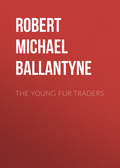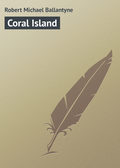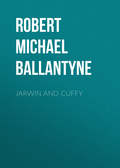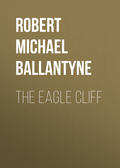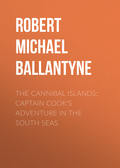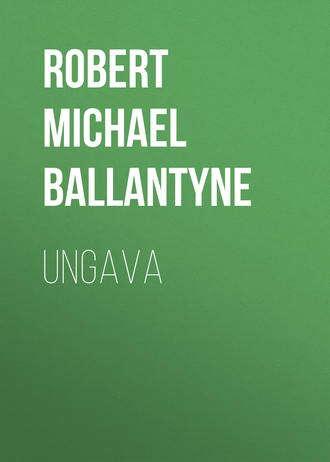
Robert Michael Ballantyne
Ungava
Chapter Thirty Two.
Edith waxes melancholy, but her sadness is suddenly turned into joy; and the Esquimaux receive a surprise, and find a friend, and lose one
The sea! How many stout hearts thrill and manly bosoms swell at the sound of that little word, or rather at the thought of all that it conveys! How many there are that reverence and love thy power and beauty, thy freedom and majesty, O sea! Wherein consists the potent charm that draws mankind towards thee with such irresistible affection? Is it in the calm tranquillity of thy waters, when thou liest like a sheet of crystal, with a bright refulgent sky reflected in thy soft bosom, and the white ships resting there as if in empty space, and the glad sea-mews rippling thy surface for a brief moment and then sailing from the blue below to the deeper blue above, and the soft song of thy wavelets as they slide upon the shingly shore or lip among the caves and hollows of the rocks! Or is it in the loud roar of thy billows, as they dash and fume and lash in fury on the coasts that dare to curb thy might?—that might which, commencing, mayhap, in the torrid zone of the south, has rolled and leaped in majesty across the waste of waters, tossed leviathans as playthings in its strength, rushed impetuously over half the globe, and burst at last in helplessness upon a bed of sand! Or does the charm lie in the yet fiercer strife of the tempest and the hurricane, when the elements, let loose, sweep round the shrinking world in fury; or in the ever-changing aspect of thy countenance, now bright and fair, now ruffled with the rising breeze, or darkened by the thunder-cloud that bodes the coming storm!
Ah yes! methinks not one but all of these combined do constitute the charm which draws mankind to thee, bright ocean, and fills his soul with sympathy and love. For in the changeful aspects of thy visage there are talismans which touch the varied chords that vibrate in the hearts of men. Perchance, in the bold whistle of thy winds, and the mad rolling of thy waves, an emblem of freedom is recognised by crushed and chafing spirits longing to be free. They cannot wall thee round. They cannot map thee into acres and hedge thee in, and leave us naught but narrow roads between. No ploughshare cleaves thee save the passing keel; no prince or monarch owns thy haughty waves. In thy hidden caverns are treasures surpassing those of earth; and those who dwell on thee in ships behold the wonders of the mighty deep. We bow in adoration to thy great Creator; and we bow to thee in love and reverence and sympathy, O sea!
Edith sat on the sea-shore. The glassy waves were no longer encumbered with ice, but shone like burnished gold in the light of the summer sun. Here and there, however, a large iceberg floated on the deep—a souvenir of winter past, a guarantee of winter yet to come. At the base of these blue islands the sea, calm though it was, broke in a continual roar of surf, and round their pinnacles the circling sea-birds sailed. The yellow sands on which the child sat, the green willows that fringed the background of brown rocks, and the warm sun, contrasted powerfully with the vestiges of winter on the sea, while a bright parhelia in the sky enriched and strengthened these characteristics of an arctic summer.
There was busy life and commotion in the Esquimau camp, from which Edith had retired to some distance to indulge in solitude the sad reveries of home, which weighed more heavily on her mind as the time flew by and the hope of speedy delivery began to fade.
“O my own dear mother,” sighed the child aloud, while a tear trickled down each cheek, “shall I never see you more? My heart is heavy with wishing, always wishing. But no one comes. I never see a boat or a ship on that wide, wide sea. Oh, when, when will it come?”
She paused, and, as she had often done before, laid her face on her hands and wept. But Edith soon recovered. These bursts of grief never lasted long, for the child was strong in hope. She never doubted that deliverance would come at last; and she never failed to supplicate at the throne of mercy, to which her mother had early taught her to fly in every time of trouble and distress.
Soon her attention was attracted from the sea, over whose wide expanse she had been gazing wistfully, by the loud voices of the Esquimaux, as a number of them prepared to embark in their kayaks. Several small whales had been descried, and the natives, ever on the alert, were about to attack them. Presently Edith observed Peetoot running along the beach towards her with a seal-spear or harpoon in his hand. This youth was a remarkably intelligent fellow, and had picked up a few words and sentences of English, of which he made the most.
“Eeduck! Eeduck!” he cried, pointing to one of the oomiaks which the women were launching, “you go kill whale—funny; yes, Eeduck.”
“I don’t think it will be very funny,” said Edith, laughing; “but I’ll go to please you, Peetoot.”
“Goot, Eeduck; you is goot,” shouted the boy, while he flourished his harpoon, and seizing his companion by the hand, dragged her in the direction of the kayaks.
In a few minutes Edith was ensconced in the centre of the oomiak amid a pack of noisy Esquimau women, whose tongues were loosed and spirits raised by the hope of a successful hunt. They went merely for the purpose of witnessing the sport, which was to be prosecuted by twelve or thirteen men, each in his arrow-like kayak. The women sat round their clumsy boat with their faces to the bow, each wielding a short, broad paddle, with which they propelled their craft at good speed over the glassy wave; but a few alternate dips of the long double-bladed paddles of the kayaks quickly sent the men far ahead of them. In the stern of the oomiak sat an old grey-headed man, who filled the office of steersman; a duty which usually devolves upon old men after they become unfit to manage the kayak. Indeed, it requires much vigour as well as practice to paddle the kayak, for it is so easily upset that a man could not sit in it for a minute without the long paddle, in the clever use of which lies the security of the Esquimau.
When the flotilla had paddled out a short distance a whale rose, and lay as if basking on the surface of the water. Instantly the men in the kayaks shot towards it, while the oomiak followed as fast as possible. On drawing near, the first Esquimau prepared his harpoon. To the barb of this weapon a stout line, from eight to twelve fathoms long, was attached, having a dan, or float, made of a sealskin at the other end of it. The dan was large enough to hold fifteen gallons or more.
Having paddled close to the whale, the Esquimau fixed the harpoon deep in its side, and threw the dan overboard. The whale dived in an agony, carrying the dan down along with it, and the Esquimau, picking up the liberated handle of the harpoon as he passed, paddled in the direction he supposed the whale must have taken. In a short time the dan re-appeared at no great distance. The kayaks, as if shot from a bow, darted towards the spot, and before the huge fish could dive a second time, it received two more harpoons and several deep stabs from the lances of the Esquimaux. Again it dived, carrying two additional dans down with it. But the dragging tendency of these three large floats, combined with the deep wounds it had received, brought the fish sooner than before to the surface, where it was instantly met and assailed by its relentless pursuers, who, in the course of little more than an hour, killed it, and dragged it in triumph to the shore.
The natives were still occupied in towing the captured fish, when one of the men uttered a wild shout, and pointed eagerly out to sea. At first Edith imagined that they must have seen another whale in the distance; but this opinion was quickly altered when she observed the eager haste with which they paddled towards the land, and the looks of surprise with which, ever and anon, they regarded the object on the horizon. This object seemed a mere speck to Edith’s unaccustomed eyes; but as she gazed long and earnestly at it, a thought flashed across her mind. She sprang up; her sparkling eyes seemed as though they would burst from their sockets in her eager desire to make out this object of so great interest. At this moment the oomiak touched the land. With a bound like a gazelle Edith sprang on shore and ran panting with excitement to the top of a rocky eminence. Here she again directed her earnest gaze out to sea, while her colour went and came as she pressed her hands upon her breast in an agony of hope. Slowly but surely the speck came on; the wind shifted a point, which caused a gleam of sunlight to fall upon a sail. It was a boat! there could be no doubt of it—and making directly for the island! Unable to contain herself, Edith, uttering a piercing cry, sank upon the ground and burst into a passionate flood of tears. It was the irresistible impulse of hope long deferred at length realised; for the child did not entertain a doubt that this was at length the answer to her prayers.
Meanwhile the Esquimaux ran about in a state of extraordinary excitement. These people had very probably heard of the ships which once a year pass through Hudson’s Straits on their way to the depôts on the shores of Hudson’s Bay; but they had never met with them, or seen a Kublunat (white face) before that great day in their annals of discovery when they found little Edith fainting in the snow. Their sharp eyes had at once detected that the approaching boat was utterly different from their own kayaks or oomiaks. And truly it was; for as she drew near with her white sails bending before the evening breeze that had recently sprung up, and the Union Jack flying from her peak, and the foam curling before her sharp prow, she seemed a very model of grace and symmetry.
There were only three figures in the boat, one of whom, by the violent gesticulations that he made as they approached, bespoke himself an Esquimau; the other two stood erect and motionless, the one by the tiller, the other by the sheet.
“Let go,” said a deep soft voice, when the boat was within a stone’s-cast of the shore.
The sheet flapped in the wind as the peak fell, and in another instant the keel grated on the sand.
For one moment a feeling of intense disappointment filled Edith’s heart as she sought in vain for the face of her father or Frank; then with a cry of joy she sprang forward and flung herself into the arms of her old enemy, Gaspard!
“Thank God!” said Dick Prince, with a tremulous voice, as he leaped lightly from the boat and clasped the child in his arms; “thank God we have found you, Miss Edith! This will put new life into your poor mother’s heart.”
“Oh! how is she? Why did she not come with you?” sobbed Edith; while Dick Prince, seating himself on a rock, drew her on his knee and stroked her fair head as she wept upon his shoulder.
Meanwhile Annatock was being nearly devoured by his wife and child and countrymen, as they crowded round him to obtain information, and to heap upon him congratulations; and Gaspard, in order to restrain, and at the same time relieve his feelings, essayed to drag the boat out of the water, in which attempt, giant though he was, being single-handed, he utterly failed.
After the first eager questions were answered on both sides, the natives were informed by their comrade of the nature and objects of the establishment at Ungava, and they exhibited the most extravagant signs of joy on hearing the news. When their excitement was calmed down a little, they conducted the party to their principal tent, and set before them the choicest viands they possessed, talking vehemently all the while, and indulging in a few antics occasionally, expressive of uncontrollable delight.
“Ye see, Miss Edith,” began Prince, when he and Gaspard were seated before a round of walrus-beef, “the way we came to know your whereabouts was this: Gaspard and me was sent down to the coast to hunt seals, for we were getting short o’ blubber, and did not like to be obleeged to give deer’s-meat to the dogs. Your father gave us the boat; ‘for,’ says he, ‘Prince, it’ll take ye down faster than the canoe with this wind; and if ye see any o’ the natives, be sure ye don’t forget to ask about her, Prince.’ Ye see, Miss Edith, ever since ye was lost we never liked to mention your name, although we often spoke of you, for we felt that we might be speakin’ o’ the dead. Hows’ever, away we went for the shores o’ the bay, and coasted along to the westward a bit. Then we landed at a place where there was a good lot o’ field-ice floatin’, with seals lyin’ on it, and we began to catch them. One day, when we was goin’ down to the ice as usual, we saw a black object sittin’ on a floe that had drifted in the night before with a stiff breeze.
“‘That’s a queer-lookin’ seal,’ says Gaspard.
“‘So ’tis,’ said I. ‘If there was ever black bears up hereabouts, I would say it was one o’ them.’
“‘Put a ball in yer gun,’ says Gaspard; for ye see, as we had been blazin’ at small birds the day before, there was nothing but shot in it. So I put in a ball, and took aim at the beast, intendin’ to give it a long shot. But I was mercifully prevented from firin’. Jist as I squinted along the barrel, the beast rose straight up, and held up both its fore paws. ‘Stop!’ roars Gaspard, in an awful fright; and sure enough I lowered my gun, and the beast hailed us in the voice of a man, and began to walk to the shore. He seemed quite worn out when he landed, and I could understand enough of his jargon to make out that he had been blown out to sea on the floe, and that his name was Annatock.
“While we were talkin’ to the Esquimau, Gaspard cries out, ‘I say, Prince, look here! There’s a sort o’ medal on this chap’s neck with somethin’ written on it. You’re a larned fellow, Prince; see if ye can make it out.’ So I looked at it, and rubbed my eyes once or twice, I can tell you, for, sure enough, there was EDITH as plain as the nose on my face.”
“Oh,” exclaimed Edith, smiling through her tears, “that was the medal I hung round his neck long, long ago! I hoped that it might be seen some day by people who knew me.”
“I thought so, miss,” returned Prince—“I thought as much, for I knew that the Esquimau could never have invented and writ that out of his own head, ye see. But Gaspard and me had most awful trouble to get him to explain how he came by it, and where he came from. Howsoever, we made out at last that he came from an island in this direction; so we just made up our minds to take the boat and come straight away for the island, which we did, takin’ Annatock to pilot us.”
“Then does my father not know where you are, or anything about your having heard of me?” inquired Edith, in surprise.
“Why, no, Miss Edith,” replied Prince. “You see, it would have lost us two or three days to have gone back to Fort Chimo; and, after all, we thought it might turn out a false scent, and only raise your poor mother’s hopes for nothin’. Besides, we were sent away for a week or two, so we knew they wouldn’t wonder at our absence; so we thought, upon the whole, it would be best to come at once, specially since it was sich a short distance.”
“A short distance!” repeated Edith, starting up. “I thought we must be miles and miles, oh, ever so far away! Is the distance really short?”
“Ay, that it is, little one,” said Prince, patting the child on the head. “It is not more than three days’ rowing from this island, and a stiff breeze on the quarter would carry us there in less than two.”
“And Frank, where is Frank?” said Edith,—with a look of eager inquiry.
“Ah, miss,” replied Prince, “he has been away almost as long as yourself. Soon after you were lost a packet came from the south, and he was obleeged to give up the sarch after you—though he was loath to do it—and set out with three o’ the men for Moose. From that day to this we’ve heerd nothin’ of him. But the journey he had to make was a long one—havin’ to go round all the way to York Fort—so we didn’t expect to hear o’ him afore now. But I’ll tell ye more about all your old friends when we git—things ready for a start to-morrow.”
The remainder of that day was spent in making preparation for setting sail on the following morning. The first intimation of the existence of the new trading-fort had thrown the child-like natives into rapturous delight; but when Prince told them he intended to go off the next day with the child who had been as a bright spirit in their camp so long, they fell into the depths of grief. Indeed, there was manifested a slight desire to offer forcible opposition to this; but when Edith told them, through the medium of Peetoot, who acted as her interpreter, that the distance to her father’s fort was not great, and that she would expect them to come often there, and stay long, they became reconciled to her departure; and when she sought to turn their minds (a work of no great difficulty at any time) away from that subject by describing to them the treasures of the trading-store, they danced and laughed and sang like very children. Even Kaga’s baby crowed with a racy richness of feeling, and smiled with an oily brilliancy of expression, compared with which all its former exhibitions were mere child’s play.
But when the hour of departure really came, and Edith bade farewell to her kind friends, whose rude but warm hospitality she had enjoyed so long, they were again plunged into the deepest distress; and when the little boat finally put to sea, there was not a tearless eye among the tribe, while Edith was swiftly borne from their island shore before a strong and favouring breeze.
Chapter Thirty Three.
The clouds are broken, the sun bursts through and once more irradiate Port Chimo—Hopes and fears for Maximus
The wings of time moved slowly and heavily along at Fort Chimo. Hope long deferred, expectation frequently reviving and as often disappointed, crushed the spirits of the little party. The song, and jest, and laugh seldom sounded from the houses of the men, who went through their daily avocations almost in silence. Not only had the loss of Edith—the bright spirit of the place, the tender rosebud in that savage wilderness—cast an overwhelming gloom upon the fort, but the failure of the trade, to a great extent, had added to the general depression, and now fresh anxiety was beginning to be felt at the non-appearance of Frank Morton.
“Jessie,” said Stanley one day, as he rose from the desk at which he had been writing, and put on his cap with the intention of taking a stroll along the beach, “will you come with me today? I know not how it is, but every time I go out now I expect to hear the ship’s gun as it comes through the narrows.”
Mrs Stanley rose, and throwing on a shawl and hood, accompanied her husband in silence.
“Perhaps,” she said at length, “you expect to hear the gun because the vessel ought to be here by this time.”
As she spoke, La Roche came up and touched his cap. “Please, madame, vat you vill have pour dinner?”
“Whatever you please, La Roche. Repeat yesterday’s,” answered Mrs Stanley, with the air of one who did not wish to be troubled further on the subject. But La Roche was not to be so easily put down.
“Ah, madame! pardonnez moi. Dat is impossible. Ve have fresh fish yesterday, dere be no fresh fish to-day. More de pity. C’est dommage—dat Gaspard him gone away—”
La Roche was interrupted by a sudden exclamation from his master, who pointed, while he gazed earnestly, towards the narrows of the river. It seemed as if the scene of last year were repeated in a vision. Against the dark rock appeared the white, triangular sail of a vessel. Slowly, like a phantom, it came into view, for the wind was very light; while the three spectators on the beach gazed with beating hearts, scarcely daring to credit their eyes. In a few seconds another sail appeared—a schooner floated into view; a white cloud burst from her bows, and once again the long, silent echoes of Ungava were awakened by the roaring of artillery. The men of the fort left their several employments and rushed to the beach to welcome the vessel with a cheer; but although it was heartfelt and vigorous, it was neither so prolonged nor so enthusiastic as it was on the first occasion of the ship’s arrival.
As the vessel dropped anchor opposite the fort, Frank Morton leaped on her bow, and along with the crew returned the cheer with a degree of energy that awakened memories of other days.
“There’s Frank!” cried Stanley, turning on his wife a glance of joy. “Bless the boy! It warms my heart to see him. He must have picked up some Indian woman by the way. I see the flutter of a petticoat.”
As he spoke, the boat pushed off from the vessel’s side, and a few rapid strokes sent it bounding towards the shore.
“Eh! what’s this?” exclaimed Stanley, as his wife broke from him, and with a wild shriek rushed into the lake.
The figure of a child stood on the boat’s bow, with her arms extended to the shore.
“Hurrah, lads! give way!” shouted Frank’s deep voice.
“Mother! mother!” cried the child.
In another moment Frank bounded over the boat’s side and placed Edith in her mother’s arms!
Reader, there are incidents in the histories of men which cannot be minutely described without being marred. Such an one was the meeting between the father and mother and their long-lost child. We refrain from attempting to draw aside the curtain further than to say that the joy and gratitude in more than one heart at Ungava found vent that night in thanksgiving to Him who can bring light out of darkness and turn sorrow into joy.
The greater part of the day was spent at the fort in that feverish excitement which cannot calm down to steady conversation, but vents itself in eager, rambling questions and abrupt replies. Meanwhile, the necessity of discharging the cargo of the vessel, and preparing the furs for shipment, served to distract the attention and occupy the hands of the whole party.
As evening advanced, La Roche, true to his duty, placed supper on the table, and Stanley and his wife, along with Edith and Frank, while they partook of the meal, continued their inquiries.
“Whereabouts was it, Frank, that you fell in with the boat?” said Stanley.
“Not more than five miles from the mouth of the river, at about six this morning. We observed the boat beset by a pretty solid pack of ice, and you may be sure we were not a little surprised when we saw the Union Jack run up to her peak; so I ordered our boat to be lowered, intending to go to her assistance. While the men were doing this, I examined her with the glass, and then it was that I found, to my amazement and inexpressible joy, that the boat contained Prince, Gaspard, and Edith.”
“Ah! Frank,” said Mrs Stanley, “was it not a strange providence that you, who were so sad at being compelled to give up the search, should be the one appointed to find our beloved child, and bring her back to us?”
“Nay,” replied Frank, “it was not I who found her. Let me not rob Dick Prince and Gaspard of the honour and gratitude which they have nobly won.”
“And what do you think of the non-arrival of Maximus?” said Stanley, whose feelings were still too much perturbed to allow him to dwell for more than a few minutes at a time on any subject. Frank shook his head.
“I know not what to think,” said he. “As I have told you already, we left him at Moose Fort with his recovered bride, and we got the missionary to marry them there in due form. Next day they started in a small canoe on their return voyage to Ungava, and the day following I left for Lake Superior. I fully expected to find them here on my return.”
Stanley looked grave. “I fear much,” said he, “that some mischance has befallen the good-hearted Esquimau. He was well armed, you say, and amply supplied with provisions?”
“Ay, most certainly. He took two guns with him, saying that his wife was as good a shot as himself.”
“The men wish to know where the heavy goods are to be put,” said Massan, as he opened the door, and stood, cap in hand, awaiting orders.
Stanley rose to leave the room.
“I’ll be with you in a minute, Massan.—Then, Frank, we’ll expect an account of your journey to-night. Eda is very anxious that we should be told all about your wonderful adventures in the mountains. Meanwhile I shall be off to look after the men.”
When the sun had set that night, and the song of the sailors had ceased, and most of the wearied inhabitants of Fort Chimo were enjoying a fragrant pipe after the labours of the day, Frank and Stanley seated themselves, one on either side of the fire-place, with Mrs Stanley and Edith in front of the hearth between them. An extra pine-knot was thrown on the fire, which, in a few minutes, rendered the candle on the table unnecessary. Stanley lit his pipe, and after drawing one or two whiffs to make sure that it would keep alight, said,—“Now, Frank, my boy, we’re ready for you; fire away.”
Frank fired away, literally, for he applied a piece of glowing charcoal to his pipe, and fired off half a dozen rapid puffs in reply, as it were, to his friend opposite. Then he began.



